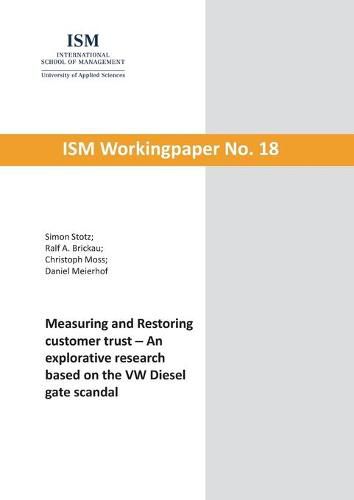Readings Newsletter
Become a Readings Member to make your shopping experience even easier.
Sign in or sign up for free!
You’re not far away from qualifying for FREE standard shipping within Australia
You’ve qualified for FREE standard shipping within Australia
The cart is loading…






This title is printed to order. This book may have been self-published. If so, we cannot guarantee the quality of the content. In the main most books will have gone through the editing process however some may not. We therefore suggest that you be aware of this before ordering this book. If in doubt check either the author or publisher’s details as we are unable to accept any returns unless they are faulty. Please contact us if you have any questions.
Much has been written about trust. Despite the fact that there is a general understand-ing of how important trust is in interpersonal and business relations it becomes obvi-ous that this construct remains somewhat indistinct when it comes to pinning down how trust is build or destroyed, how levels of trust can be measured precisely and how trust can be restored if it has deteriorated. Therefor this research makes use of an earlier model by Kreikenberg (2013) which pro-vides one of the most comprehensive models for measuring trust via seven trust-build-ing factors in five trust-dimensions. This model, due to its complexity, has been adapted and simplified. Moreover, the model was enhanced to include an empirical approach to detect trust building measures to restore trust. The adapted model was put to an empirical test on the Volkswagen Diesel Exhaust Scandal of 2015 with VW-customers. Findings show that the adapted model could pro-vide results on which dimensions and factors show a deterioration of trust and simul-taneously how trust gaps detected could be filled via measures proposed by custom-ers. Although this research must be called explorative, results give some indication that the new model appears to work satisfactory and should be put to further empirical tests in other companies and industry to find further proof for a general applicability.
$9.00 standard shipping within Australia
FREE standard shipping within Australia for orders over $100.00
Express & International shipping calculated at checkout
This title is printed to order. This book may have been self-published. If so, we cannot guarantee the quality of the content. In the main most books will have gone through the editing process however some may not. We therefore suggest that you be aware of this before ordering this book. If in doubt check either the author or publisher’s details as we are unable to accept any returns unless they are faulty. Please contact us if you have any questions.
Much has been written about trust. Despite the fact that there is a general understand-ing of how important trust is in interpersonal and business relations it becomes obvi-ous that this construct remains somewhat indistinct when it comes to pinning down how trust is build or destroyed, how levels of trust can be measured precisely and how trust can be restored if it has deteriorated. Therefor this research makes use of an earlier model by Kreikenberg (2013) which pro-vides one of the most comprehensive models for measuring trust via seven trust-build-ing factors in five trust-dimensions. This model, due to its complexity, has been adapted and simplified. Moreover, the model was enhanced to include an empirical approach to detect trust building measures to restore trust. The adapted model was put to an empirical test on the Volkswagen Diesel Exhaust Scandal of 2015 with VW-customers. Findings show that the adapted model could pro-vide results on which dimensions and factors show a deterioration of trust and simul-taneously how trust gaps detected could be filled via measures proposed by custom-ers. Although this research must be called explorative, results give some indication that the new model appears to work satisfactory and should be put to further empirical tests in other companies and industry to find further proof for a general applicability.